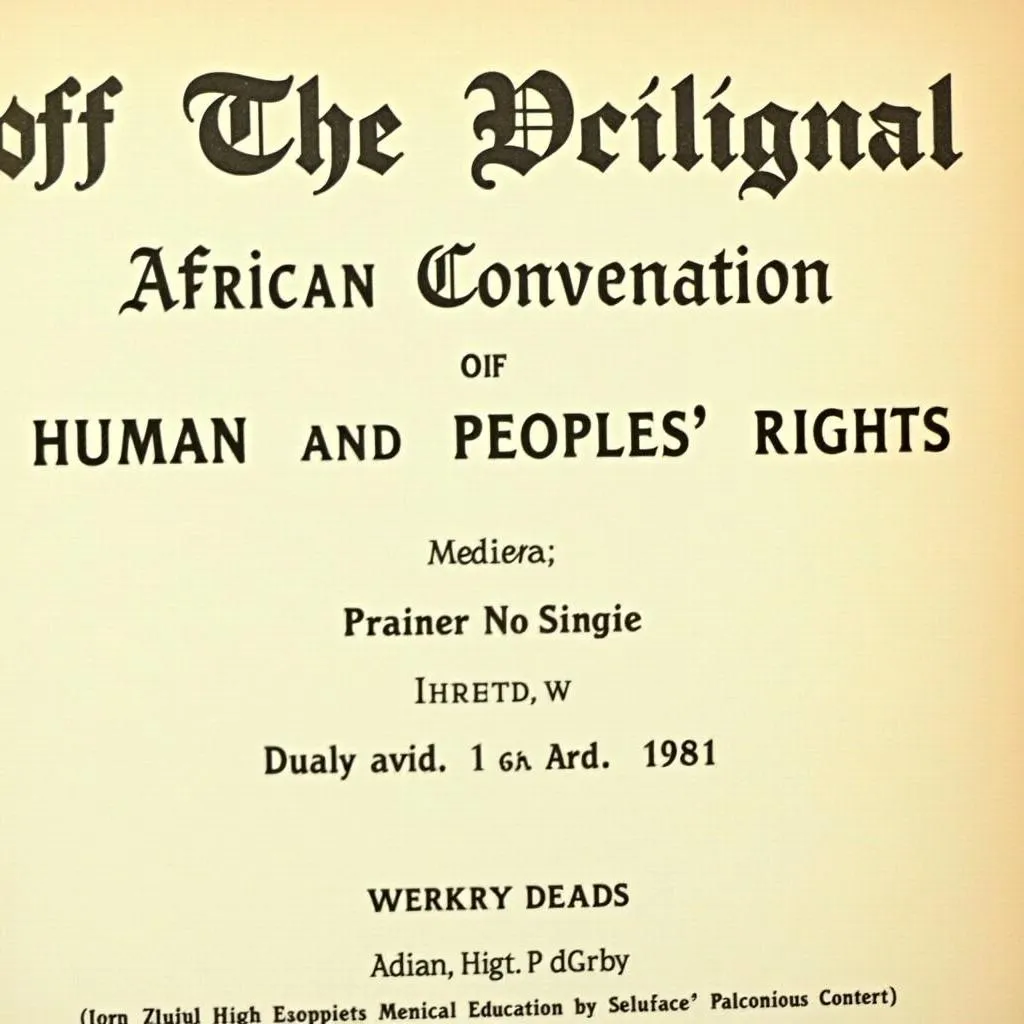The African Convention on Human Rights: A Cornerstone of Human Rights Protection in Africa
The African Convention on Human and Peoples’ Rights, also known as the Banjul Charter, is a crucial human rights instrument in Africa, established in 1981 and entered into force in 1986. It outlines fundamental human rights and freedoms for all people in Africa, aiming to create a just and equitable society. This convention serves as a cornerstone for promoting human rights and ensuring their protection across the continent.
The Birth of the African Convention on Human Rights
The creation of the African Convention on Human and Peoples’ Rights was a significant milestone in the struggle for human rights in Africa. It was born out of the realization that colonial rule had inflicted widespread violations of human rights, and the need for a dedicated legal framework to address these injustices and build a better future. The Convention was adopted by the Organization of African Unity (OAU), now known as the African Union (AU), and represented a collective commitment from African nations to uphold human dignity and protect fundamental rights.
Key Provisions of the African Convention on Human Rights
The African Convention on Human and Peoples’ Rights covers a broad range of rights, including:
- Civil and Political Rights: These rights encompass fundamental freedoms such as the right to life, freedom from torture, freedom of opinion and expression, freedom of assembly and association, and the right to a fair trial.
- Economic, Social and Cultural Rights: These rights are equally essential for the well-being and dignity of individuals, including the right to work, education, health, and social security.
- Rights of Peoples: This aspect of the Convention recognizes the rights of peoples to self-determination, development, and cultural heritage preservation.
The African Commission on Human and Peoples’ Rights
The African Commission on Human and Peoples’ Rights is the body responsible for overseeing the implementation of the Convention. It receives complaints of human rights violations, conducts investigations, and issues recommendations to states to address these issues. The Commission plays a vital role in promoting human rights standards and holding states accountable for their obligations under the Convention.
The African Convention’s Impact on Human Rights in Africa
The African Convention on Human and Peoples’ Rights has had a profound impact on human rights in Africa. It has:
- Provided a legal framework for promoting human rights: The Convention provides a clear set of principles and standards for human rights, which governments and civil society organizations can use to advocate for rights and hold states accountable.
- Supported the establishment of national human rights institutions: Many African countries have established national human rights institutions to promote and protect human rights within their borders, inspired by the principles enshrined in the Convention.
- Empowered civil society: The Convention has emboldened civil society organizations to play a more active role in promoting and defending human rights.
- Increased awareness of human rights: The Convention has raised awareness of human rights among the general public, leading to greater activism and demand for accountability.
The African Convention on Human Rights and the Future of Human Rights in Africa
The African Convention on Human and Peoples’ Rights remains a powerful instrument for promoting human rights in Africa. However, challenges remain, including:
- Implementation gaps: Despite its importance, the Convention’s implementation faces challenges, including a lack of resources, political will, and capacity in some countries.
- Human rights violations: Human rights violations continue to occur in various parts of Africa, including extrajudicial killings, torture, discrimination, and restrictions on freedom of expression.
- Emerging challenges: New challenges to human rights are emerging in the 21st century, including cybercrime, the impact of climate change, and the rise of populism and nationalism.
The African Convention on Human and Peoples’ Rights is a critical tool for addressing these challenges and ensuring a brighter future for human rights in Africa. It requires continuous advocacy, monitoring, and implementation to achieve its full potential.
FAQs
1. What is the difference between the African Convention on Human and Peoples’ Rights and the Universal Declaration of Human Rights?
The African Convention on Human and Peoples’ Rights complements the Universal Declaration of Human Rights by providing a regional framework specific to the African context. While the Universal Declaration sets out universal principles, the African Convention addresses particular challenges and nuances faced by African states.
2. How can I get involved in promoting human rights in Africa?
There are many ways to get involved, including supporting human rights organizations, advocating for policy changes, raising awareness through education and outreach, and engaging in peaceful activism.
3. What are some examples of human rights violations that the African Convention addresses?
The African Convention addresses a wide range of human rights violations, including torture, arbitrary arrest and detention, discrimination, forced displacement, and violations of the rights of women and children.
4. What are the challenges facing the African Convention on Human and Peoples’ Rights?
The African Convention faces challenges such as implementation gaps, ongoing human rights violations, and emerging threats to human rights, requiring continuous efforts to promote and protect human rights in Africa.
5. What is the future of human rights in Africa?
The future of human rights in Africa depends on the continued commitment of governments, civil society organizations, and individuals to uphold the principles enshrined in the African Convention.
 African Convention on Human and Peoples' Rights Document
African Convention on Human and Peoples' Rights Document
By working together and upholding the principles of the African Convention, we can build a future where human rights are respected and protected for all people in Africa.